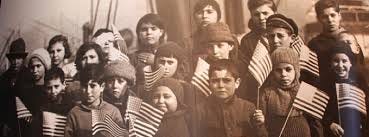Immigrant Assimilation
I grew up in a loving household in which my maternal Italian grandparents were a pervasive presence and dominant force. In those halcyon days assimilation was not a dirty word. My grandparents were not pressured to give up their own culture and fully adopt the culture of Americans. (the dominant group) They were proud of their hard-earned ability to speak broken English even to the dismay of my American father whose mother and father immigrated from I Ireland. I remember him repeatedly telling Nono and Noni to "speak to the boy in Italian," which they did, (not sufficiently) but remained more diligent in practicing their English.
The left, which is intent of altering definitions of words to promote an anti-American agenda completely distorts the beauty of the meaning of assimilation which they interpret as demeaning to immigrants. Once more stirring the antagonism created by an "us versus them" mentality. The prefer acculturation or syncretism which like so many of their divisive and derogatory tactics is meant to diminish American exceptionalism by fracturing our unity,
During the Second World War care packages (food and clothing) were regularly sent to my grandparent's relatives in war torn Italy. They had not abandoned their blood, country of origin, customs, or values. Their values were indistinguishable from American values: what I learned from them, and my parents, were reinforced by my teachers at school. Russian, Polish, German, Sicilian and other Italian immigrants lived in harmony on the same street, as good neighbors, and newly minted citizens. They shopped at the variety store at the end of the street owned and operated by a broken English-speaking Polish woman. Around the corner they frequented Hymie's butcher store, whose proprietor's Jewish roots were in Eastern Europe. My grandmother and Hymie exhibited a deep affection for one another. He always added a little extra (lagniappe) to her purchase from him.
None gave up their traditions, almost all willingly pursed a fundamental competency in English and were proud of their citizenship. They flew American flags, celebrated the 4th of July with exuberance, and by their demonstrable gratitude they taught their children genuine appreciation for being an integral part of the melting pot. (Assimilation) They did not relinquish their traditional holidays, and their native cuisines elevated the customary meat and potatoes diet which was the common fare of Americans. It, incidentally, broke barriers and facilitated friendships.
I had the advantage of experiencing a childhood that was a United Nations experience in which I observed disparate cultures coming into contact and thriving on the inter-relations. I know I did, and it prompted a greater understanding in me of what it means to be an American. "Happy to be an America, "in "the land of the free and the home of the brave."
In those years the blessings of America were celebrated, individual responsibility was a given, and the individual's highest aspirations were believed to be achievable by adapting to the rule of success as "99% perspiration and 1% inspiration."
In those days immigrants passed through Ellis Island yearning to be assimilated, relying of the privilege of being an American, and imagining opportunities for their children that were tangible, far exceeding those in their previous homelands. Assimilation meant for them the adoption of new cultural elements and the retention of some aspects of the original culture. It was a two-way process with both groups influencing each other. Intermarriages between people from different cultures and celebrating both traditions became commonplace.
Slowly and stunningly, we have strayed from common sense. It is axiomatic that English knowledge opens economic doors of opportunities. Since speaking English helps immigrants to fully integrate into American life, we should insist that they learn for their own good and the common weal. Most of them want to.
While we are insisting on their duty we are obliged to facilitate their transition and provide them with the tools to succeed. Learning English is the gateway to personal and familial flourishing, but without an understanding of "we the people" and the role of aa citizen in a participatory democracy they and we "become as sounding brass and a tinkling cymbal."
One of the most famous quotes about never stopping learning comes from Albert Einstein who said: "Once you stop learning you start dying."
I've never heard a better definition about what it means to be an American than in the attached video.



